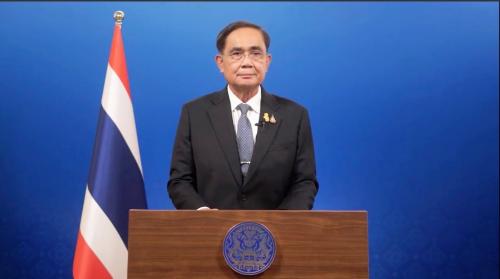Prime Minister and Defense Minister Gen. Prayut Chan-o-cha stated that climate action and regional cooperation needed to be scaled up to strengthen capacities in responding and adapting to climate change.
The statement was part of his remarks via a teleconference at the Opening Ceremony of the 79th Session of the United Nations Economic and Social Commission for Asia and the Pacific (ESCAP) on 15 May 2023 in Bangkok.
The Prime Minister said that Thailand was well aware of the climate change as a common challenge for all countries. Many areas across the Asia and Pacific region have faced climate-related disasters that are becoming more frequent and more severe.
He said that Thailand embraced the Sufficiency Economy Philosophy as guidance for the country’s development and climate action, which would promote resilience of communities. Furthermore, Nationally Determined Contributions and Long-Term Low Emissions Development Strategies (LT-LEDS) have been revised to meet the country’s climate targets to achieve carbon neutrality by 2050 and net zero greenhouse gas emissions by 2065. Thailand supports cooperation in combating climate change at the regional level, which is key to solving this problem.
The Prime Minister proposed three priorities to support climate action in the region. First, ESCAP’s work should be in synergy with and complement other regional and subregional cooperation frameworks, such as the “Bangkok Goals on the Bio-Circular-Green Economy,” which aims to create a more balanced and environmentally friendly economic growth and help accelerate the implementation of the SDGs in tandem with climate action.
Second, science, technology, and innovation should be leveraged in the climate actions. Thailand utilizes earth observation satellites to monitor greenhouse gas emissions in the forestry sector, as well as to identify droughts and hotspots to avert fires and transboundary haze pollution. It stands ready to elevate cooperation through mechanisms at all levels.
Third, health risk management and public health preparedness will help minimize the impacts of climate change and help the public adapt. Through harnessing its expertise, ESCAP is in an ideal position to bolster the region’s strengths by enhancing the capacity of its Member States.
The 79th Session of ESCAP is being held as a hybrid session from 15 to 19 May 2023, under the theme: “Accelerating climate action in Asia and the Pacific for sustainable development.”












